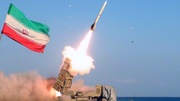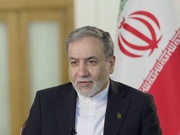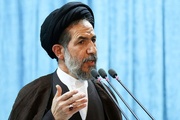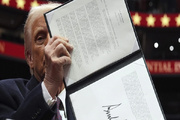During a Monday session with the IAEA Board of Governors, director general of the International Atomic Energy Agency Rafael Grossi claimed that the UN agency "has lost continuity of knowledge in relation to the production centrifuges, rotors and bellows, heavy water, and uranium”.
He also raised concerns about "public statements made in Iran regarding its technical capabilities to produce nuclear weapons." These concerns appeared to have been addressed during his productive visit to Iran a month ago.
In an interview with the Financial Times shortly after his trip, Grossi optimistically announced that Tehran had shown the desire for “serious negotiations” with the IAEA, adding he prefers not to go down a path that could escalate tensions with Iran.
Grossi's unexpected shift in tone was followed by the passing of an anti-Iran resolution at the IAEA Board of Governors. The resolution proposed by Germany, France, and Britain criticized Iran for "moving away from its JCPOA commitments." It called on Iran to immediately stop its nuclear "escalation" and comply with the limits established by the JCPOA, a pact signed in 2015 regarding the West Asian country’s nuclear program.
JCPOA a dead pact killed by the West
The Joint Comprehensive Plan of Action went down the drain when in 2018, Washington decided to pull out from the pact it had signed along with Iran, Germany, Britain, France, Russia, and China. Subsequently, the White House imposed severe sanctions on Iran, thereby breaching the crucial article of the deal that had encouraged Iran to participate in the first place.
“When the E3 criticizes Iran for not fully complying with the JCPOA, it essentially disregards the real reason why Tehran is scaling back on its commitments: the JCPOA is now dead because of the West,” said Reza Mir Taher, an expert on strategic affairs. “For 1.5 years after the U.S. left the deal, Iran remained fully committed while it waited for Europe to make the Instrument in Support of Trade Exchanges (INSTEX) work.”
Established in early 2019, INSTEX was a special-purpose vehicle (SPV) created by Germany, Britain, and France with the goal of enabling non-USD and non-SWIFT transactions with Iran in order to circumvent U.S. sanctions. The system was ultimately dismantled by Europe in 2023 after failing to facilitate any transactions between Iran and the European trio.
“How do Europeans expect Iran to comply with the JCPOA when they themselves have not? Where is the logic in that? It is only natural that Iran thinks of the deal as useless,” Mir Taher added.
Western hopes for Iran’s upcoming elections
Before the recent adoption of a new anti-Iran resolution by the IAEA Board of Governors on Wednesday, Iran's Head of the Atomic Energy Organization, Mohammad Esmali, issued a stern warning that his country would respond firmly to any further provocative actions.
In a joint statement after the meeting, Iran, Russia, and China said they still consider the JCPOA valid, asking the West to return to implementing the deal instead of putting unnecessary pressure on Tehran.
Given that the resolution lacks binding force, the decision by Europe to escalate tensions with Iran following the UN nuclear watchdog's recent productive visit to the country raises questions. One plausible explanation could be linked to the upcoming presidential elections in Iran. Some analysts suggest that the resolution may be a deliberate move to provide an edge to Iranian candidates who are more conciliatory towards the West during upcoming televised debates. Specific contenders have a reputation for leveraging the nuclear program dispute to instill fear in Iranian society and secure electoral support.
“It is unfortunately true that some candidates have instrumentalized important issues in the past to rally support. I think contenders from across the political spectrum need to understand that such an approach is only detrimental to our national interests,” Mir Taher stated.
Leader of the Islamic Revolution Ayatollah Seyyed Ali Khamenei ordered snap elections in line with Iran’s constitution after President Ebrahim Raisi and Foreign Minister Hossein Amir Abdollahian lost their lives during a helicopter crash on May 19.
The politicians who have nominated themselves to run for president hold different political views. Some are known for hawkish policies toward the West, and some for tying Iran’s existence to the revival of the JCPOA, under any circumstances.
First published by Tehran Times























Your Comment